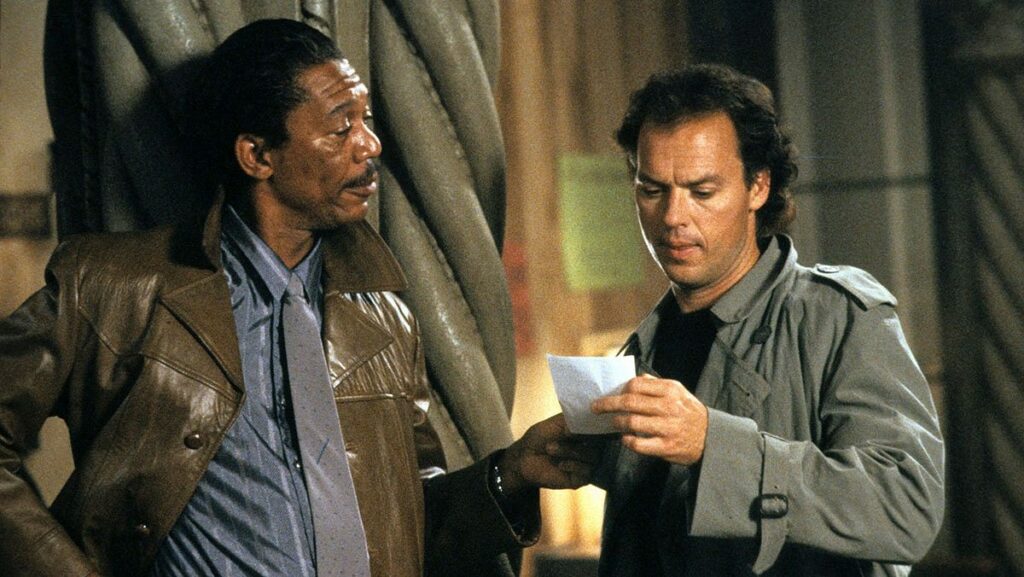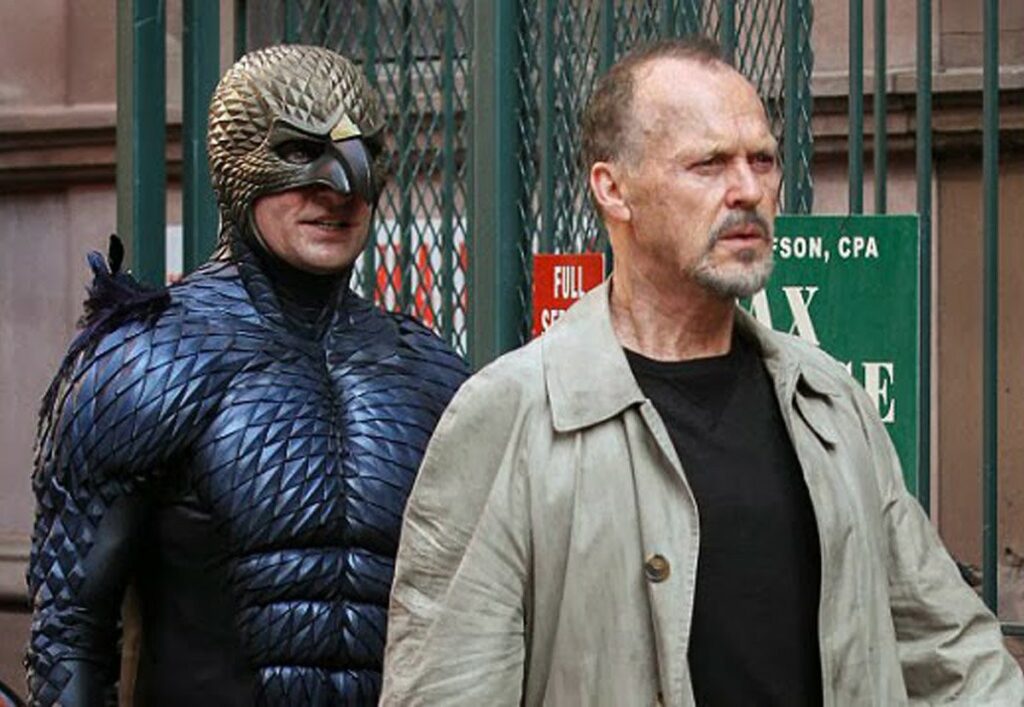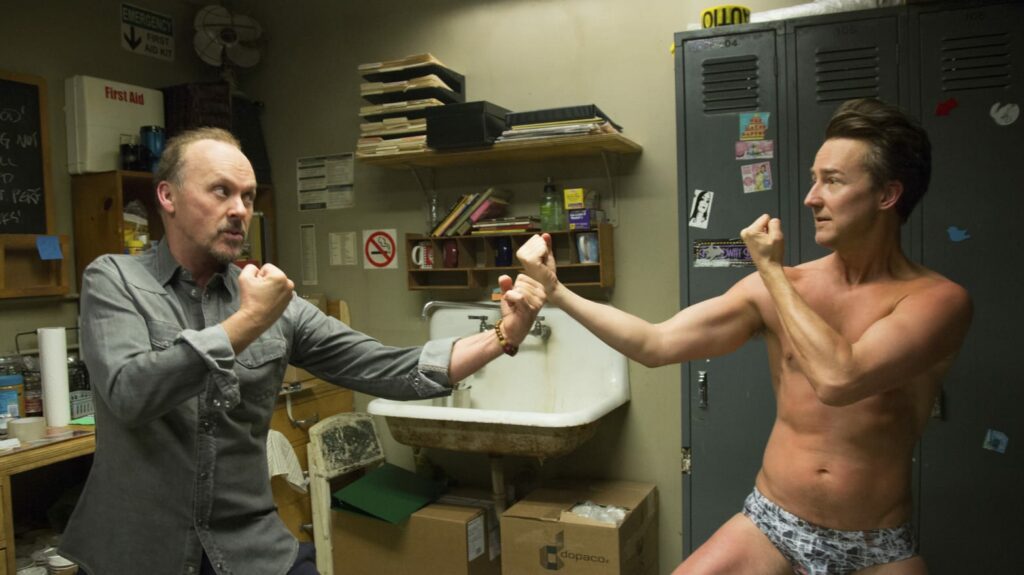Potential spoilers ahead. You’ve been warned.
MICHAEL KEATON
Films: Birdman (or the Unexpected Virtue of Ignorance), Spotlight
I’ll be honest, it never occurred to me to add Michael Keaton to this list, until I spoke with a co-worker about her admiration for Michael Keaton. I was talking about actors who excelled in both comedy and drama, and she pointed out Keaton. That led me on a journey to re-evaluate Keaton’s filmography. Before this was pointed out to me, I never thought of Keaton as primarily a comedic actor. To me, he was just an actor. Some of the work he did was funny and some was serious. Yes, I knew he played Batman, but for the longest time, I only knew him from movies like Jackie Brown or The Other Guys (in which, I believe him to be severely underrated in). As a child, I knew him as Lindsay Lohan’s dad in Herbie Fully Loaded and for his voice work in Cars and Toy Story 3. It took me until my early twenties to finally see Night Shift and Beetlejuice. Hell, I only just watched Multiplicity and Mr. Mom for the first time within the last year. What blew my mind even further was the discovery that he started off doing stand-up. There was a documentary made recently about The Comedy Store in LA. Keaton was being interviewed and it showed footage of him doing a routine in the early 80s. That being said, now that I understand the sheer gravity of Keaton’s comedic persona, I believe he is 100% eligible for this list. I couldn’t help but notice the parallels to Tom Hanks’ career, having both started in comedy. A side note: I debated adding Hanks to the list, but I think he is far more prominent in dramatic roles than he ever was in comedy. Looking at his filmography, the last true comedy he was a part of (with the exceptions of his romantic comedies with Meg Ryan) was probably A League of Their Own in 1992. So, unfortunately, he did not make the list. Okay, back to Keaton.

For this list, I am primarily going to focus on the movies Birdman and Spotlight, though he has taken on other serious roles. One thing I noticed in doing my research is that Keaton always had a steady career, but he faced a resurgence when he was nominated for an Academy Award for his performance in Birdman. Following Birdman, Keaton appeared in films like Spotlight, The Trial of the Chicago 7 (a very small part), The Founder, and as the villain in Spider-Man: Homecoming (a performance I greatly admire). The only post-Birdman movie I will be discussing is Spotlight, simply because it’s the strongest, and dare I say most significant one of the bunch. And at the peak of his resurgence with Birdman and Spotlight, Keaton was in two back-to-back Best Picture winners.
I also think it is worth noting that Keaton had attempted dramatic roles early on in his career, with little success. In 1988, one year before he played the Caped Crusader, he appeared in a drama called Clean and Sober. He played a hot shot real estate developer with a cocaine and alcohol problem, who to keep a low profile from authorities, checks himself into a drug rehabilitation program. I admire Keaton for acting against type, but Keaton’s performance isn’t even the best one in the movie, in my opinion. That honor would go to a young(ish) Morgan Freeman, playing Keaton’s drug counselor, a former addict himself. I’m not factoring TV into my list, but Keaton’s performance seems like in most cases, the antithesis, and sometimes compliment to his role as an Opioid prescribing doctor turned addict in Hulu’s Dopesick. It’s a hard watch, but Keaton is heartbreakingly brilliant in an Emmy-winning role. Okay, that’s all I have to say about that. Back to the movie. In my opinion, though, the thing Keaton had going against him was that the film was so damn boring. It could not hold my interest. The film is only a shade over two hours, but it dragged. No joke, I paused the movie when I thought it was almost over and there were still another 45 minutes remaining. I think that’s ultimately one of the reasons the film did poorly at the box office and didn’t make much of a cultural impact. And too, maybe the audience wasn’t ready to see him as a dramatic actor. After all, I mentioned this was a year before Batman. And I think we all know or have read about the backlash his casting received.

I’ve mentioned the title enough times, but let’s finally talk about Birdman. Director Alejandro G. Inarritu gave the film a subtitle, The Unexpected Virtue of Ignorance, but for the sake of writing, I’ll just refer to it by the main title. In this film, Keaton plays Riggan Thomson, a fading actor who bets everything on a stage adaptation of a Raymond Carver work, that Riggan is writing, directing, and starring in himself. The film draws on some parallels in Keaton’s real life, as Riggan was most famous for playing a superhero character known as Birdman in three films (Keaton was only in two Batman films). Riggan is struggling to escape the shadow of his famous alter ego, both figuratively and literally. Inarritu gives the film a little bit of a fantasy element because Riggan has vocal arguments with the Birdman voice he hears in his head and the bird even appears (in full costume) following Riggan as he walks down the street. The film is certainly unique because it blends real life with just a hint of the fantastical.
Taking place over two nights before the opening of his play, Riggan tries his hardest to keep things afloat. In this chaos, he is surrounded by unique personalities. There’s an aspiring Broadway actress Lesley, (Naomi Watts), another Broadway actress and Riggan’s lover Laura (Andrea Riseborough), Riggan’s fresh out of rehab daughter and assistant, Sam (Emma Stone), Riggan’s lawyer/producer, Jake (Zach Galifanakis), and acclaimed (and notoriously difficult) stage actor, Mike (Edward Norton). Over the next two days, Riggan has to keep things intact as they fall apart around him, leading to a threat of litigation, a lover’s quarrel, a spat with his daughter, a raging hard-on, and a walk through Times Square in only his briefs.
Riggan’s motives for doing the play remain unclear. Riggan claims he is doing the play because he feels compelled to tell the story, while others believe it to be an attempt to regain the fame he once had. In one scene, after Riggan upsets Sam and says that he’s “trying to do something that means something.” She verbally berates him, telling him “You are not doing this for the sake of art. You are doing this because you want to feel relevant again! You’re doing this to prove that you matter, but guess what, you don’t!” She’s not wrong in this statement either. When his ex-wife (Amy Ryan) visits him in his dressing room, she comments that “you always mistake love for admiration.” I think that line perfectly sums up the character. The way Keaton handles a complex character so full of emotions is truly masterful. You can’t help but feel bad for Riggan and hope he succeeds, but there’s also a level of patheticness Keaton brings to the character. All Riggan wants back is his reputation. It’s pathetic that he thinks this play is the only way to salvage what remains of his reputation.

There’s a lot of vagueness throughout the film. As mentioned, I don’t think anyone knows what Riggan’s true intentions are. Is he doing the play for art or self-preservation? I truly don’t know. I do, however, know that he at least has some standards. In an argument with his Birdman voice, the voice laments that he turned down an offer to do a reality show about his life as “a fading actor with a druggy daughter and a MILF wife with perky tits.” The other issue that remains uncertain is Riggan’s intentions during the finale of the play. At the end of the play, the character commits suicide, but Riggan uses a live weapon for the opening night premiere. He survives the shooting, but wakes up in the hospital with a new nose, putting him one step closer to becoming his alter ego. The question of was this shooting an attempted suicide or a tragic accident, becomes pointless because Riggan got the one thing he wanted: relevance. He’s all over the news now and the Critic who set out to destroy him gave him a positive review. So where does Riggan go from here? That’s up to each person to decide, and that’s why Inarritu left the ending open for interpretation.
Overall, it’s hard not to talk about Keaton’s performance alone. You can’t not mention the other performances or the direction. Emma Stone is a terrific actor and this is my favorite performance of hers. It was also a pivotal one in her career. This is where she broke out of romantic comedies and showed her acting chops, earning the first Oscar nomination of her career. Norton was pretty good too. He earned his third Oscar nomination for portraying a caricature of himself, and Galifinakis brought a surprising wit and warmth to his character. As fantastic as the performances are, you also can’t not focus on Inarritu’s direction. He chose to give the film the appearance that it is one uninterrupted, continuous take. What would be daunting for even veteran directors, Inarritu pulls off to great effect. Though being named Best Picture was divisive at the time, almost a decade later, the film not only holds up in its quality but also in its themes.

I’ll talk just a little bit about Spotlight. The film follows the investigative arm of the Boston Globe, Spotlight, as they investigate the allegations against the Catholic Church that they covered up the systematic sexual abuse of children by priests. Keaton plays Walter “Robby” Robinson, the editor of Spotlight. The film is very much an ensemble piece, but Keaton is certainly a central character. In a way, he’s the father figure to the young journalists he leads. He’s often the voice of reason, and as the team unearths some truly terrifying discoveries, he can remain calm. Despite his calmness, he is no less pissed off and no less willing to make enemies than the rest of his team. Keaton doesn’t have the showiest role (Mark Ruffalo and Rachel McAdams were singled out for Oscar nominations), but he remains an essential part of the story. Again, I feel like I can’t speak too much on Keaton’s performance, just because it’s not as prominent as his work in Birdman.
The film was my favorite of 2015. It was one of the few times I left a theater feeling not only entertained, but moved, and quite frankly, pissed off. At the Academy Awards that year, it beat out the perceived favorite The Revenant (also directed by Inarritu) to win Best Picture. It’s an interesting case too, because it’s one of only two Best Picture winners that only won one other award (Original Screenplay). I’ll end by saying that Keaton is a skilled actor and I’m excited to see what he does next.
Check this out: ‘Birdman’ Extended Scene with Michael Keaton